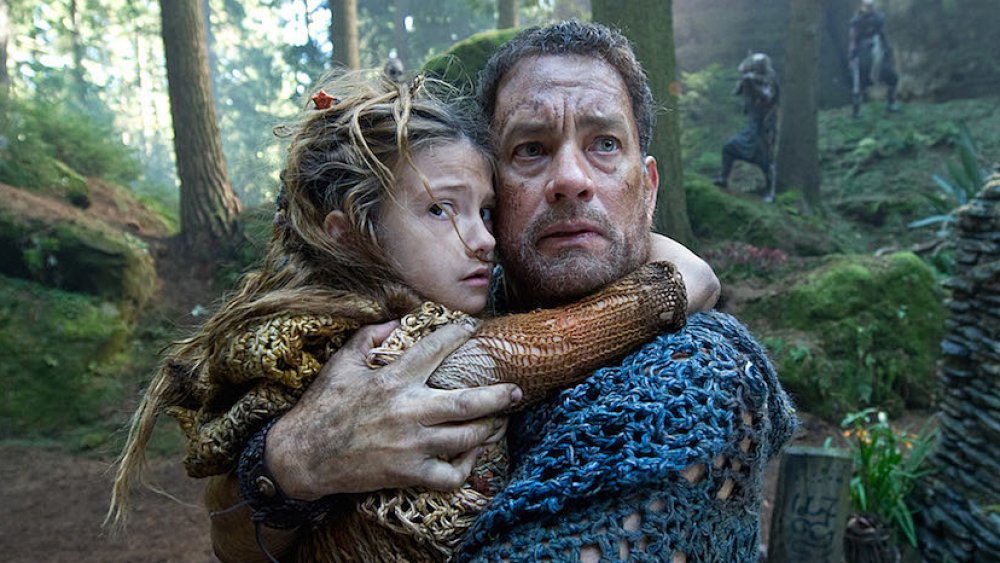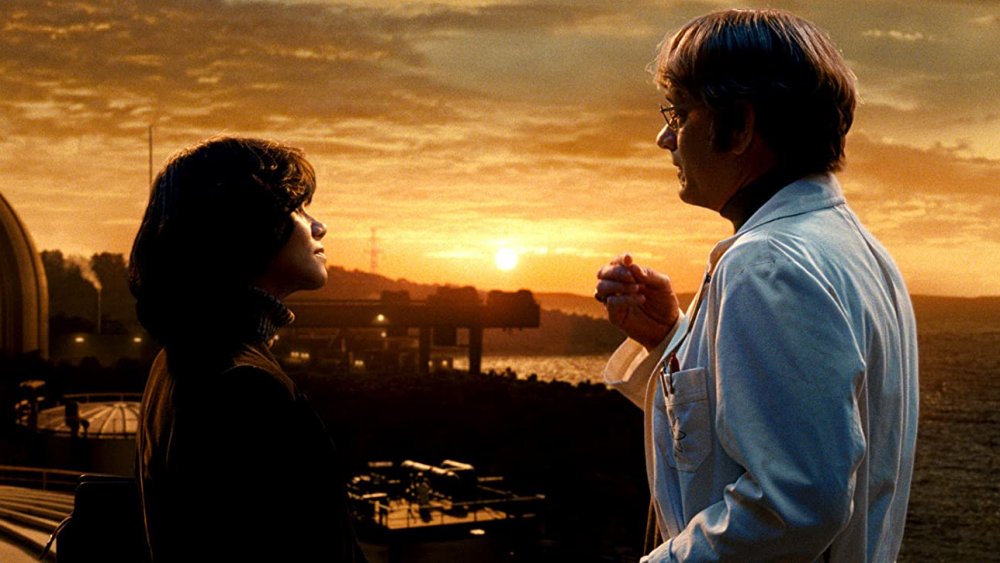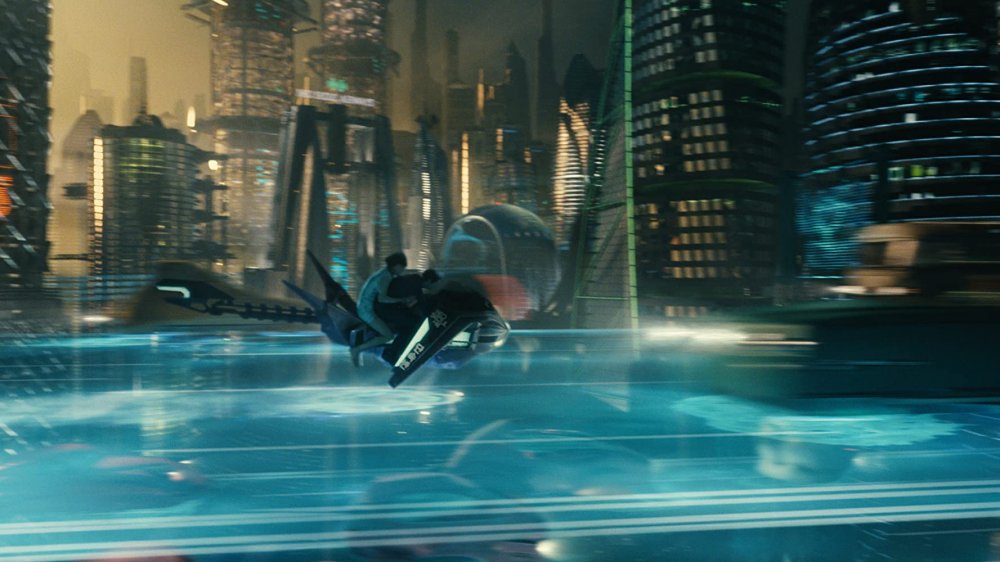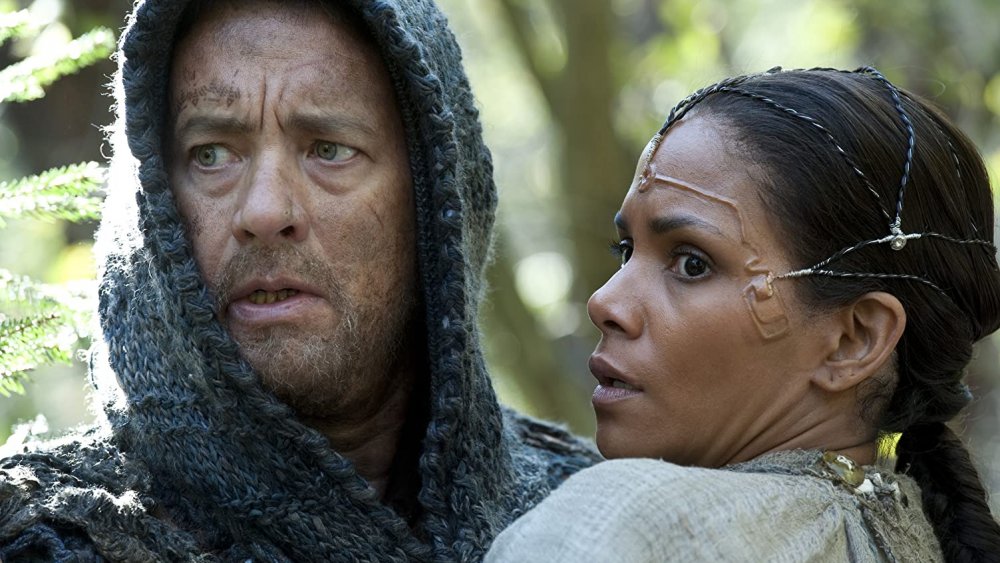Netflix Nabs One Of The Decade's Most Underrated Sci-Fi Movies
Ready to have your mind blown by those expert purveyors of heady sci-fi, the Wachowskis, and an all-star cast? Netflix is about to add a movie that may interest you.
2012's Cloud Atlas will be available to watch on the streamer starting on July 1, 2020 – and if you've never seen it, you're in for a treat. For that matter, if you have seen it, you'll probably want to watch it again, because getting your head all the way around the movie upon first viewing is no small feat.
Likewise, Cloud Atlas is not easily synopsized. It's an absolutely sprawling work, telling a series of interconnected stories which take place over the course of nearly five centuries. Every member of the main cast plays multiple roles as the movie jumps across different time periods (many of them at times appearing in heavy makeup), with a different actor filling the "lead" role after each time jump.
That is to say that this is a wildly unconventional film, which one might have expected from an adaptation of author David Mitchell's similarly dense and ambitious 2004 novel. It is the only one of their films on which the Wachowskis collaborated with another writer-director: Tom Tykwer, who helmed such flicks as Run Lola Run and Perfume: The Story of a Murderer, and who would go on to work with the sisters again on their cult hit Netflix series Sense8. Did we mention that Cloud Atlas sports a ridiculously stacked cast? The film stars Tom Hanks, Hugo Weaving, Halle Berry, Susan Sarandon, Jim Broadbent, Ben Whishaw, Hugh Grant, Doona Bae, Jim Sturgess, Keith David, and James D'Arcy — and they all acquit themselves quite well, despite the fact that they're each tasked with filling five or six distinct roles.
What is Cloud Atlas about?
Cloud Atlas takes place in six different time periods, with the first segment opening in the Pacific Islands in 1849. Sturgess stars as American lawyer Adam Ewing, who witnesses the brutalities of the slave trade while on a seafaring journey. He's joined on his voyage by an African man (David Gyasi) who saves his life from the machinations of a nefarious doctor (Hanks). Upon returning home to San Francisco, Ewing and his wife become abolitionists.
The second segment takes place in 1936, and stars Whishaw as Robert Frobisher, a bisexual composer who is threatened with outing by his employer (Broadbent), who wants credit for Frobisher's masterpiece, the "Cloud Atlas Sextet." Inspired by Ewing's journal (which he had found in his employer's home), Frobisher refuses to be blackmailed — and takes a shocking course of action.
The third segment takes place in 1973, and finds Frobisher's old flame, Rufus Sixsmith (D'Arcy), who is a nuclear physicist, attempting to expose a conspiracy to cause an accident at his plant by a powerful man named Hooks (Grant) with the help of a journalist named Luisa (Berry). This ties in with the fourth segment, which takes place in 2012 and stars Broadbent as book publisher Timothy Cavendish, who is inspired by Luisa's story to write a screenplay after he manages to elude a murder plot set in motion by a gangster (Hanks) intent on siphoning off his profits.
The fifth segment leaps all the way to 2144, and stars Bae as Somni, a "fabricant" (a lifelike android used for slave labor) who is inspired to rebellion after reading the story of Cavendish's involuntary institutionalization. She's introduced to an entire rebel movement, but is eventually recaptured and executed after she recounts her story to an archivist. Finally, the sixth segment takes place in 2321 and stars Hanks as Zachry, a resident of a post-apocalyptic village in a society where Somni (thanks to her archived recounting of her experience) is worshiped.
Was Cloud Atlas a box office hit?
Despite that stacked cast and the involvement of the Wachowskis, Cloud Atlas was a significant flop upon its release. The $100 million picture managed only about $130 million at the worldwide box office, which amounted to a substantial loss for studio Warner Bros. once marketing and promotion costs were figured in.
The film likely wasn't helped by the complexity of its narrative and utter refusal to hold the hands of its audience, not to mention its nearly three-hour run time. Of course, while such complaints can help to sink a movie's theatrical performance, they're often mitigated by the home viewing experience — so if the movie's butt-numbing length dissuaded you from catching it in the theater, here's your chance to give it the day on court it deserves.
The flick received mixed-to-positive reviews, but among those critics to offer virtually unreserved praise was the great Roger Ebert, who passed away only six months after its release. In his four-star review, Ebert wrote, "Surely this is one of the most ambitious films ever made... I was never, ever bored by Cloud Atlas. On my second viewing, I gave up any attempt to work out the logical connections between the segments, stories and characters. What was important was that I set my mind free to play... Oh, what a film this is! And what a demonstration of the magical, dreamlike qualities of the cinema."
We wholeheartedly agree, and there has never been a better time to let Cloud Atlas wash over you.
Will there ever be a Cloud Atlas sequel?
Sequels, reboots, and spin-offs are all the rage in our current day and age, so its understandable that some may question whether another Cloud Atlas movie is in the cards — even with how divisive it was amongst critics when it first debuted. While there haven't been any talks about making a straight-up sequel to Cloud Atlas, fans of the film may take heart in knowing that the book upon which it's based is one of many penned by author David Mitchell.
The British writer released two novels (plus another to be published in 2114) following Cloud Atlas, 2014's The Bone Clocks and 2015's Slade House, both of which are said to be connected to Cloud Atlas vis-á-vis implicit rather than explicit links. In October 2015, The Daily Beast even described Slade House as "the scary new sequel to Cloud Atlas," and a "sequel of sorts to Bone Clocks," considering they're all connected.
For anyone longing for more of the fantastical speculative fiction that Mitchell delivered with Cloud Atlas, The Bone Clocks and Slade House could be right up your alley. Whether either of those novels get the film adaptation treatment in the future remains to be seen — but if they do, Mitchell may very well be supportive of it. After all, he went on record in October 2012, about a week prior to the theatrical launch of Cloud Atlas, to express his satisfaction with what the Wachowskis and Tykwer had done in adapting his work. In a post published to The Wall Street Journal, Mitchell wrote, "Adaptation is a form of translation, and all acts of translation have to deal with untranslatable spots [...] When asked whether I mind the changes made during the adaptation of Cloud Atlas, my response is [this]: The filmmakers speak fluent film language, and they've done what works."



